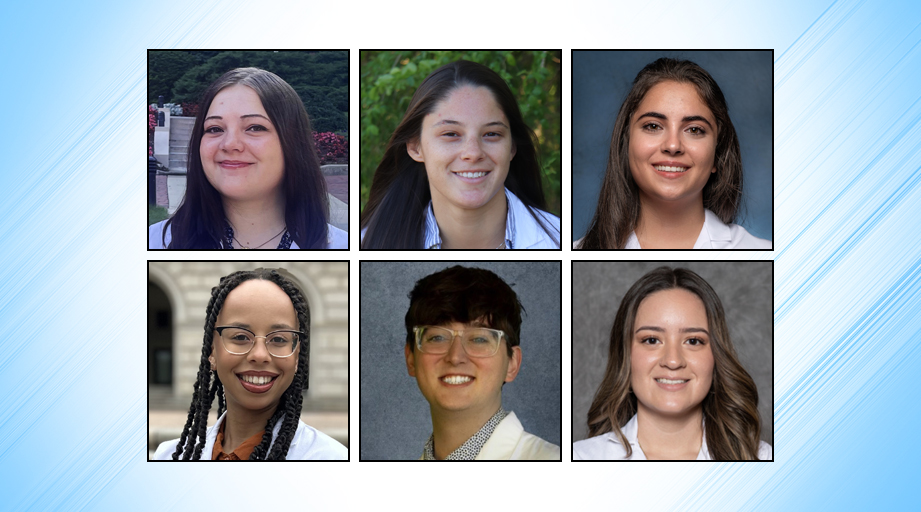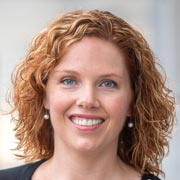
They are shopping for new business suits, packing stuffies, and planning for their downtime — with an episode of the “Oncology Today” podcast or “Bones,” perhaps?
Six pharmacy students are gearing up for their first ASHP Policy Week, which takes place next week at ASHP’s headquarters in Bethesda, Maryland. Each serving on a different council or commission, these students are getting a front-row seat to the annual kickoff of ASHP’s policymaking process.
The students attending ASHP Policy Week 2024 are:
- Allison G. Given, a third-year student at the University of Charleston School of Pharmacy
- Macaleigh C. Mancuso, a fourth-year student at Auburn University Harrison College of Pharmacy
- Amelia Monfared, a fourth-year student at Chapman University School of Pharmacy
- Quinn L. Mosgrove, a fourth-year student at The University of Texas at Austin College of Pharmacy
- Travis R. Schubert, a fourth-year student at Texas Tech University Health Sciences Center
- Maria Ybargüengoitia Agüero, a fourth-year student at The University of New Mexico College of Pharmacy
We caught up with the students to learn more about them and how they’re preparing for Policy Week. Check out their answers for some D.C. sightseeing tips, entertainment picks, and a glimpse into the future of pharmacy. (Plus some consensus about the most difficult P2 classes!)
Note: Responses have been edited slightly for length and clarity.
How are you getting psyched for ASHP Policy Week?
Allison: Making sure I am in the loop with everything happening in ASHP and pharmacy in general. My favorite part of being a student is getting to take part in events like this and soak up information!
Quinn: Shopping for business professional outfits.
Maria: Reviewing the amazing content from previous years to get a sense of what to expect. I am beyond excited to finally meet everyone in person!
Macaleigh: Collaborating with fellow Council on Pharmacy Management members on sunset reviews and discovering the best places to eat in D.C.
What’s one surprising thing in your suitcase?
Macaleigh: Outside of pharmacy school, I coach and judge competitive gymnastics. So you might find a rule book or the lesson plans I’m working on.
Travis: I always bring three to four colognes. I love to smell good!
Quinn: A portable fan.
Allison: My sister and I have matching axolotl plushies. I like bringing mine along whenever I travel so I always have a bit of home with me.
What book, show, or podcast will you enjoy during your travels?
Travis: I'm listening to the podcast “Oncology Today” to stay updated with the latest in cancer treatment.
Macaleigh: Probably my RX Prep book, but I’m hoping to sneak in an episode or two of “Bones.”
Amelia: The book I Am Malala and “The Office.”
Maria: The book Crucial Conversations, a gift from one of my APPE preceptors.
What's one thing you're looking forward to doing in D.C.?
Allison: I grew up very close to D.C., so I look forward to being close to home. I have a soft spot for museums and always recommend the National Air and Space Museum’s Udvar-Hazy Center. They have an SR-71 Blackbird, my favorite plane!
Travis: Meeting with my colleagues. This will be my first time at an event like this and I want to network and make an impression.
Maria: I am looking forward to exploring the city. I have never been to D.C.
Hardest class your P2 year?
Amelia: Gastroenterology.
Travis: Pharmacokinetics.
Quinn: Infectious disease.
Macaleigh: At Auburn, we learn by disease state. That said, anything involving infectious disease was particularly challenging for me.
Maria: Infectious disease was my hardest — but also ended up being one of my favorites.
Allison: Pharmacokinetics is the Drake to my Kendrick. I'm the biggest hater.
Favorite pharmacological fact to share with your non-pharmacist friends?
Macaleigh: Caffeine is used as a medication to help premature newborns breathe.
Quinn: Not necessarily a favorite, but the most common advice I give is to take ibuprofen with food.
Amelia: Warfarin was originally used as rat poison.
Travis: Did you know that some medications can make your sweat smell different? It’s because they change the way your body processes chemicals.
Maria: Coca-Cola was invented by a pharmacist and initially intended to be served as medicine.
Allison: The word “pharmacy” is probably derived from the Greek pharmakon, meaning spell or enchantment. The history of pharmacy has a sort of whimsy and magic to it.
How do you balance studying with your personal life?
Amelia: I make time for self-care, such as exercising and spending time with friends.
Macaleigh: I proactively block off time for anything I need or want to do. Trust me, you do not want to see my Google calendar!
Allison: If you don't get time away from the books, none of this will make sense or seem to matter. Life is an adventure, and pharmacy is only a small part of it. I have a Pyrenees mix named Doc Holliday (yes, of “Tombstone” fame) who is more than happy to smack my laptop off my lap when he believes study time is over.
As a future pharmacy professional, why is advocacy important to you?
Quinn: I believe advocacy is crucial for promoting the value of our work as pharmacists and improving patient outcomes. By engaging in advocacy-related activities as a student, I will gain valuable insights into how pharmacy advocates influence policies, shape practices, and secure resources to enhance the quality of care we provide.
Travis: Advocacy ensures that the voices of pharmacists are heard in shaping healthcare policies. I want to make sure everyone's voice is heard.
Amelia: Patient safety and well-being are paramount, and we pharmacists must be equipped to advocate for ourselves and our patients.
Macaleigh: Advocacy allows us to shape policies that directly affect patient care and the future of the pharmacy profession.
How do you plan to use your pharmacy education to make a difference in the field?
Allison: My two sisters and I have cystic fibrosis, and the team that has taken care of us has always been exceptional. I aspire to be the type of pharmacist I have always looked up to.
Quinn: I plan to advocate for the integration of pharmacists into women's health as a recognized and essential specialty. My goal is to pioneer ASHP-accredited OB/GYN pharmacy residency programs, establishing standardized training and certification pathways for pharmacists in this field.
Maria: By applying not only the didactic knowledge but also the diverse perspectives I gain during my rotations. I’m committed to maintaining an open mind and continuing to grow so I can help make meaningful contributions to the field.







